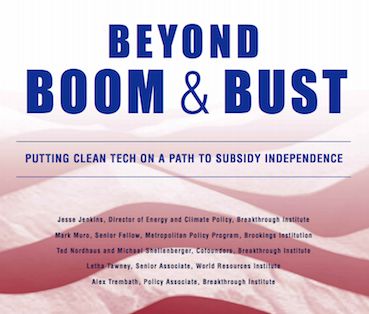Beyond Boom and Bust: Clean Energy Policy Recommendations

The recent gains made by clean tech sectors in the United States are shadowed by the looming collapse of federal subsidy support, which has been a powerful driver of expanding clean energy markets. As documented in a new report -- published by energy experts at the Breakthrough Institute, the Brookings Institution, and the World Resources Institute -- federal investment in clean tech is slated to drop 75 percent over 2009-2014. The only solution to the policy-induced cycle of boom-and-bust endured by clean tech is to optimize federal support programs to drive innovation and cost declines so that clean energy technologies can ultimately thrive on their own in American markets without subsidy.
Key Recommendations:
1. Reform Energy Deployment Subsidies and Policies to Reward Technology Improvement and Cost Declines
Expiring policies and programs are poised to wipe away the large bulk of today's clean energy deploy- ment regime. This creates a clear need for urgent policy reform to sustain market opportunities for advanced energy technologies, more effectively deploy limited public resources, and support innovative entrepreneurs and firms. Whatever form they take, a new suite of clean tech deployment policies must simultaneously drive market demand and continual innovation.
2. Strengthen the US Energy Innovation System to Make Clean Energy Cheap
A new energy policy consensus to secure an internationally competitive, subsidy-independent clean tech sector must also harness America's strengths as an innovator. The United States is home to world-class universities, generations of trained scientists and engineers, potent centers of entrepreneurship, finance, and advanced manufacturing, and a creative culture capable of attracting talent from around the world. Yet when it comes to energy, America's innovation system falls short. Policy makers must strengthen the US energy innovation system to catalyze clean energy breakthroughs and support continual technology improvement.
Clean energy policy in America is at a crossroads. Federal support for clean tech is now poised to decline precipitously--unless policy makers and industry work together to enact smart reforms that can ultimately free clean energy from subsidy dependence and put clean tech sectors on a path to sustainable, long-term growth.
A business-as-usual strategy of perpetual policy expiration and renewal is no longer sustainable. Yet neither is the immediate cessation of clean tech subsidies in the national interest. Supporting the develop- ment of a new portfolio of cost-competitive, scalable clean energy technologies offers substantial opportunities for enhanced American energy security, new technology exports, and improved public health.
The time has come to craft a new energy policy framework specifically designed to accelerate technology improvements and cost reductions in clean tech sectors, ensure scarce public resources are used wisely to drive technologies towards subsidy independence as soon as possible, and continue the growth and maturation of America's clean tech industries.
These excerpts are from an article published by The Breakthrough Institute, where you can read the full report.




